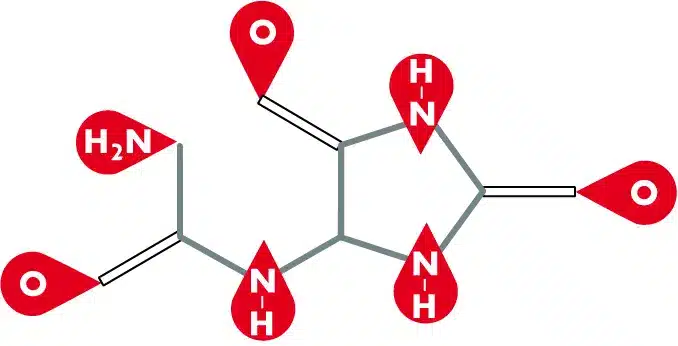Introduction
When it comes to proven active ingredients for skin care, there is hardly any way around allantoin. The substance is no longer an insider tip, but an integral part of numerous care products – from creams and aftershaves to lip balms. But what exactly makes allantoin so special? And why is this substance, which was discovered over 200 years ago, more relevant today than ever?
Origin and occurrence
Allantoin is a natural metabolite produced during the oxidation of uric acid in both animal and plant organisms. It owes its name to the allantois, an embryonic organ in birds, reptiles, and mammals where allantoin was originally discovered. Its isolation from calf urine and synthesis by German chemists Friedrich Wöhler and Justus Liebig made allantoin scientifically tangible.
The substance is found naturally in many plants, including:
- Black salsify
- Beets
- Maple trees
- Wheat germ
- Horse chestnut bark
- and especially in the root of comfrey (Symphytum officinale).
Comfrey prefers to grow in nutrient-rich, moist soils in Europe and Asia. The perennial plant can grow up to 1.5 meters high, blooms from May to August with bell-shaped, purple flowers, and contains a variety of secondary plant substances, including allantoin.
Production
In cosmetics, allantoin is now mainly produced synthetically to ensure consistent quality and purity as well as a sustainable supply. This is usually done by chemical oxidation of uric acid or by reactions between glyoxylic acid and urea.
Benefits and effects
Allantoin has proven particularly effective in skin care – and for good reason:
- Promotes wound healing: It promotes tissue regeneration and supports skin regeneration.
- Cell-stimulating: Accelerates cell renewal, which is particularly beneficial for damaged or mature skin.
- Soothing and anti-inflammatory: Allantoin relieves irritation, itching, and tightness, making it ideal for acne or sun-stressed skin.
- Keratoplastic: Softens the horny layer and facilitates the removal of dead skin cells, improving sebum flow.
- Moisturizing: Supports the skin barrier and improves suppleness.
- Smoothing and antioxidant: Gives an even complexion and protects against free radicals.
- As it is very well tolerated, it is even suitable for sensitive and inflammatory skin types.
Use in cosmetic products
Allantoin is found in a wide range of cosmetic products, including:
- Facial toners, exfoliants, and creams for blemish-prone skin
- Aftershaves and deodorants to soothe skin irritation after shaving
- Hand creams to care for rough and cracked skin
- Lip care products to regenerate chapped lips
- Foot care products, especially in combination with urea for callus removal.
- Scar care to reduce the visibility of scars.
Although allantoin itself has no antibacterial effect, it can improve the penetration of other active ingredients into the skin. This is a major advantage in multifunctional care formulations.
Storage and processing
Cosmetic formulations containing allantoin should not be stored in metal containers, as this can lead to catalytic decomposition. Typical concentrations range between 0.1% and 0.5%, which is sufficient to achieve the desired effects.
Allantoin profile
INCI: Allantoin
Alternative names: 5-ureidohydantoin, N-(2,5-dioxo-4-imidazolidinyl)urea, glyoxylic acid diureide.
CAS number: 97-59-6
EINECS number: 202-592-8
Description: Fine, white, odorless powder that is usually synthetically produced for cosmetic purposes.
Concentration: 0.1 to 0.5%.
Conclusion: Allantoin – a classic with modern relevance.
Allantoin is a versatile and well-researched active ingredient that has rightfully secured a place in modern skin care. Its many positive effects, excellent tolerability, and ability to care for even demanding skin types make it a true all-rounder.
We use the active ingredient allantoin, which meets the highest standards of effectiveness, skin compatibility, and innovation, in our high-quality private label products. We combine proven ingredients with modern biotechnological developments to create tailor-made formulations that meet the individual needs of your target group. Our focus is on quality, transparency, and the optimal synergy of all ingredients—for visible results and a compelling brand experience.
Tojo Cosmetics Private Label—your brand, our passion for effectiveness and quality.
Interested? Contact us now with no obligation.
Literature:
Nokoorani YD, Shamloo A, Bahadoran M, Moravvej H.Sci Rep. 2021 Aug 9;11(1):16164.

